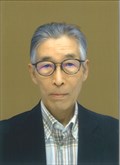
Japan Study Award
John Mark Ramseyer (Mitsubishi Professor of Japanese Legal Studies, at Harvard Law school)
Ianfu Seidorei Setsu wo Harvard Daigaku Ramseyer Kyoju ga Kanzen Ronpa(Heart Shuppan, 2023)
―English translation:[ Complete Refutation by Prof Ramseyer]
Recipient’s remarks

I am honored. I am deeply humbled and honored to receive this Japan Study Award from the Japan Institute of National Fundamentals.
Nearly four decades have passed since I first began teaching. Over those years, I have taught at a wide variety of schools, and had the good fortune to be able to work with a wide variety of brilliant scholars. But the last three years -- the years that followed the publication of my article about the comfort women -- were brutal. The fact that I have been able to resume my research is a fact I owe exclusively to the generous encouragement and support I received from so many people. "You're not the terrible person they call you," my friends and family insisted. "All you did is tell the truth; don't apologize." "If something's true, just say it's true," they insisted. And in telling me this -- over and over, day in and day out -- they kept me going. To everyone who encouraged and supported me through these three years, I thank you. I will continue to thank you for the rest of my life.
The truth is our job as scholars. And the truth about the comfort women of the Second World War is simple: they were prostitutes. There is nothing complicated about this: they were not forcibly conscripted, and they were not sex slaves. Notwithstanding, when I made these points in 2020, Western specialists of Japanese history made it clear that it was a history they did not want said. They demanded that the journal retract my article. They demanded that Harvard punish me. In the end, the journal did not retract the article, but I concluded that I needed to explain this history more fully. I wrote an article with Professor Tetsuo Arima, I wrote a book with Associate Professor Jason Morgan -- and in due course I received today's most astonishing, humbling prize. That all this came to pass is a result of the enormous amount of help I received. Please let me take this opportunity to thank the men and women who kept me going: Professor Arima, Professor Morgan, the team of skillful translators (Prof. Nobukatsu Fujioka, Ms. Yumiko Yamamoto, Mr. Shun'ichi Fujiki, Prof. Yoshiaki Yano, and Mr. Hiromichi Moteki) who produced the beautiful book that is the subject of this wonderful prize, the many scholars who offered the words of advice and encouragement, and my family. Thank you for your support, your comfort, your friendship, and your love.
The sleepless nights over the course of these last three years did give me time to think about how I would like to live the few days that remain. To me, these are not principles of politics, and they are not principles of scholarship. They are simply principles that go to living life as a full human being:
Stand by your friends, always -- comfort them, encourage them, support them.
Support anyone who tells the truth -- whether they are friends or not, support them. Support them precisely because they are telling the truth.
Always demand the truth -- whatever opposition you might face, write only what is true, and never apologize for writing the truth.
My parents served as missionaries in Miyazaki prefecture. One year, they worked in Takachiho, and when they left my father received a beautiful print of a poem. For the rest of his life, he hung the print above his desk. I loved the print, and when my father died I brought it home and hung it in my own study. The poem (by Kenji Miyazawa) is very well known. Perhaps it is so well known and so often repeated that people think it hackneyed or trite. I don't care. For me -- having lived a year in Takachiho during the 1960s --it captures the way I would like to spend the time I have left:
"If a child is sick in the east, go and nurse him,
"If a mother is tired in the west, go and carry her bundle of grain for her,
"If a person is dying in the south, go and tell him not to be afraid,
"And if people are quarreling in the north, go and tell them to talk it out.
"Not praised, not hated,
"That's the person I'd like to be."
I spent many nights sleepless over the last three years. It gave me a chance to think, and this poem captures the person I would like to become.
Thank you.
Recipient’s biography
Born in Chicago, 1954, J. Mark Ramseyer lived in Miyazaki Prefecture through age 18. He attended a local elementary school. After studying at Goshen College (B.A.) and the University of Michigan (M.A.),he graduated from Harvard Law School in 1982 (J.D., magna cum laude). After teaching at UCLA (Acting Professor, Professor, 1986-1992) and the University of Chicago (Professor, 1992-98), he became the Mitsubishi Professor of Japanese Legal Studies at Harvard. He has also taught courses at, inter alia, Hitotsubashi University (1992), Waseda University (1999), and Tel Aviv University (2013).
Professor Ramseyer is the author or co-author of a wide variety of books and articles in English and Japanese. They include Law & Economics: The Economic Analysis of Japanese Law (Kobundo, 1990) (awarded the Suntory Foundation Prize in Political Economy), Japan’s Political Marketplace (Harvard University Press, 1993) (with Frances Rosenbluth), Japanese Law: An Economic Approach (University of Chicago Press, 1998) (with Minoru Nakazato) (awarded Professional/Scholarly Publishing Award, for best book in law, Association of American Publishers), and The Fable of the Keiretsu: Urban Legends of the Japanese Economy (University of Chicago Press, 2006) (with Yoshiro Miwa) (awarded Masayoshi Ohira Memorial Prize for studies of the Pacific Basin Community).
In 2018, Ramseyer was awarded the Order of the Rising Sun, Gold Rays with Neck Ribbon.
Japan Study Special Award
Tei Taikin(Professor Emeritus at Tokyo Metropolitan University)
Ringoku no Hakken(Chikumashobo, 2023)
―English translation:[Discovering Your Neighboring Country]
Recipient’s remarks

What I have been particularly interested in in recent years is to introduce Japanese people’s essays — and diaries — based on their experiences in Korea during Japan’s annexation of their neighboring country. I tell you why I became interested in that.
First, I feel a strong sense of discontent with the fact that the relationship between Japan and the Republic of Korea is still bound by the “history” of Japanese rule over the Korean Peninsula. Japan’s past rule of Korea continues to be generally talked about as the history of “suppression” and “exploitation,” while under that premise, Japan and the Republic of Korea are expected to still behave as the “victimizer” and the “victim”, respectively.
But doesn’t that amount to a hypocritical drama played by sons and daughters who cover their faces with the masks of their parents to perform as “victimizers”or“victims”? The“victimizer-victim narrative”— a typical case of which is the claim that“comfort women were sex slaves” — is full of political arbitrariness, distortion and prejudice. This has to be decried and discarded. At the same time, it is necessary to put right the image of the period of Japanese rule that has been characterized by the words “suppression” and “exploitation.” In recent years, I have been interested in the latter. I have focused on essays because, in my view, they are impactful on people’s ways of thinking and emotions.
Second, there are many things about Japan and the Japanese people that are hard to be comprehended by people outside of it because they are peripheral and exceptional. Japan and Korea used to be situated along the periphery of the Chinese civilization. They still share the great traditions of East Asia, while they have their own indigenous cultures and traditions. That said, the uniqueness of Japan and the Japanese people is exceptional. For instance, as they are uniquely sensitive to nature and certain things around them and particular about “waza” (techniques) and “kata” (forms), there are an enormous number of people who are good at poetry. On the other hand, the Japanese people are indifferent, in relative terms, to universal ideals and ideas and tend to shy away from strangers.
When compared with the Japanese people, the Korean people’s behavioral patterns are closer to the Eurasian-style ones and their interest in universal ideals and ideas are relatively high. As the period of Japanese rule over Korea was a time during which such quirky people ruled the Korean people, it must be undoubtedly interesting.
Third, the essays I especially pay attention to are those written by Japanese people residing in Korea as well as Korean residents when Japan annexed its neighboring country, Korea. It is commonly known that Japan and Korea are homogeneous in racial, linguistic and cultural terms and that the presence of strong peer pressure in each society is characteristic of both Japan and Korea. Japan’s annexation of Korea turned out to be a period for people in the homogeneous countries to suddenly have an intensive and collective cross-cultural experience. What did Japanese people, living in Korea as strangers, and Koreans see over that period? How did they feel? What did they have in mind? It has become my pleasure of late looking for good essays that give me clues to finding out answers to those questions.
The book commended by the Kokkiken Japan Study Award Jury is the first in a four-volume series I have been looking forward to working on to the end with the aforementioned motive. At one point, I became worried that it might be difficult to publish all four books in the series unless the first book got spotlighted a little more. Therefore, I am happy to receive this award. It is also my once-in-a-lifetime pleasure to see my book selected for this award together with one of Prof. Mark Ramseyer’s books.
Recipient’s biography
Born in 1948 in Iwate prefecture, Tei Taikin attended Rikkyo University and the University of California, Los Angeles (UCLA). He taught at Dong-A University, Keimyung University and other South Korean institutions for 14 years from 1981. He belonged to Tokyo Metropolitan University’s Faculty of Humanities and Social Sciences for 18 years from 1995.
His books include: Zosatsu-ban: Kankoku no Imeji (Expanded Version: Japanese Images of Korea)(Chuokoron-Shinsha); Nippon (Ilbon) no Imeji (Korean Images of Japan)(do.); Zainichi no Taerarenai Karusa (The Unbearable Lightness of Being (Koreans) in Japan)(do.); Zainichi Kankoku-jin no Shuen (The Demise of Korean Residents in Japan)(Bunshun Shinsho); Zainichi — Kyosei Renko no ShinwaKankoku no Nashonarizumu (Nationalism of South Korea)(Iwanami Gendai Bunko); Kankoku ga ‘Hannichi’ wo Yameru Hi wa Kurunoka (Will the Day Come for the Republic of Korea to Stop Being Anti-Japanese?)(Shin Jinbutsu Oraisha); and Nikkan Heigo-ki Besuto Essei (A Collection of Best Essays During the Japanese Annexation of Korea)(Chikuma Bunko), among others.

